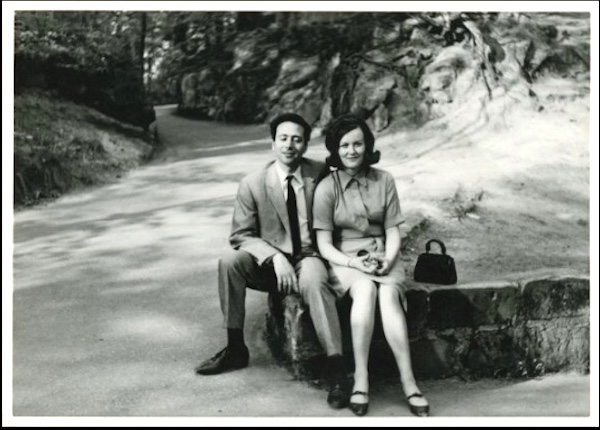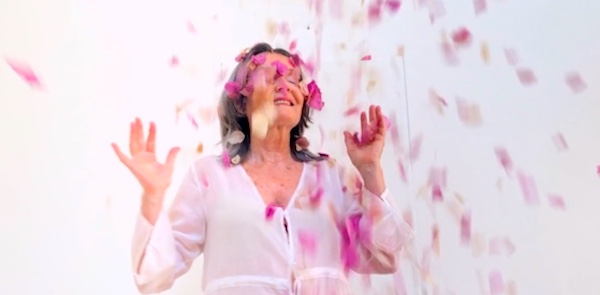
The short documentary Teta, Opi & Me celebrates love, resilience and craziness – the good craziness, that’s warm, positive and spontaneous – not that OTHER kind of craziness that we see so often these days.
Teta and Opi are Gerlinde Abu Aitah and Tawfiq Abu Aitah, the grandmother and grandfather of filmmaker Tara Hakim. Tawfiq, an Arab from Bethlehem, was studying in Austria when they met at a dance in Vienna in 1959. (Rock’n’roll! The twist!)
Tawfiq noticed Gerlinde right away. (“I saw you dancing like a crazy one!”) He wanted to dance with this wild and crazy woman. Luckily for him, she wanted to dance with him, too. Despite the many obstacles thrown their way, it seems that they have rarely been apart since then.
Teta’s mother and grandmother liked Opi; Teta’s father was kept in the dark as long as possible. He was a man who had framed his daughter’s 1942 birth certificate, the one that attested to her “pure blood.” When he found out about Opi he freaked out and did his best to keep the couple apart. Opi’s father did the same at first, though his big family eventually welcomed Teta with handholding and kisses. Teta’s father did not attend their wedding.
Love, life and war took Teta and Opi from Austria to Germany, to Bethlehem and then to Amman, Jordan.
Their story is told through family photographs and anecdotes, mostly related by Teta (“My grandmother loves to tell stories!”) when Tara visits them at their home in Amman.
Tara Hakim took part in a Q&A after the screening, so we were able to learn more about her grandparents and how she shot the film. She spent one month visiting them in Jordan. At first she tried to film with a fancy camera, lights and a boom mike, but it put too much of a distance between them; it was too unnatural. She had been shooting them on an iPhone, in person and via Skype for years and they were used to that. So she went back to that method. Sometimes they didn’t even realize that she was filming.
It was only during the Q&A that we found out that Teta’s father accepted the relationship at some point.
Hakim said that her grandfather will be 80 in January, but he still works six days per week. He says that he’s going to work until the day he dies. Guess he enjoys it! Hard work has paid off, because their house and flower-filled garden look lovely. (He had studied business administration when he was in Europe.)
During one scene in Teta, Opi & Me, Teta tells a story while making something in the kitchen. What was it? “Potato dumplings,” Tara said. “Delicious!”
Language lesson: Opi often calls Teta crazy, in an affectionate way. At the beginning of the film, Tara Hakim tells us that the Arabic word for crazy is majnūn ( مَجْنون ). The Arabic word for bougainvillea sounds very similar and the couple’s garden is full of them. The flowers appear often in the film.

Teta, Opi & Me is being shown at RIDM, Montreal’s documentary film festival, along with two other shorts. Turning Tables, directed by Chrisann Hessing, is about Joshua DePerry, a music producer, DJ and dancer from the Anishinaabe community in Thunder Bay. It’s 16 minutes long. Dreaming Murakami, directed by Nitesh Anjaan, is about Mette Holm, the Danish translator of the Japanese novelist Haruki Murakami. It’s 57 minutes long.
Teta, Opi & Me
Country : Canada, Jordan
Year : 2018
V.O : English, German, Arabic
Subtitles : English
Duration : 25 min
Cinematography : Tara Hakim
Editing : Tara Hakim
Production : Tara Hakim
Sound Design : Ryan McCambridge
Teta, Opi & Me
Friday, Nov. 16, 2018, 8:15 p.m.
CINÉMA DU PARC – Salle 3
3575 Park Ave, Montreal, QC H2X 3P9
Visit the RIDM web site for more information about the festival.
<p><a href=”https://vimeo.com/286966534″>Teta, Opi & Me Trailer</a> from <a href=”https://vimeo.com/ttara”>Tara</a> on <a href=”https://vimeo.com”>Vimeo</a>.</p>












